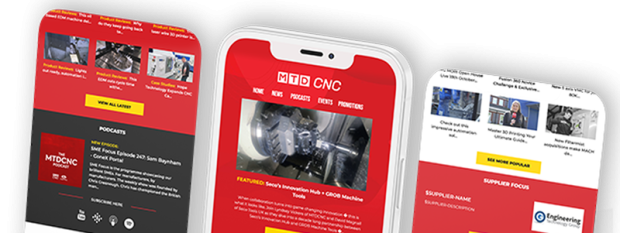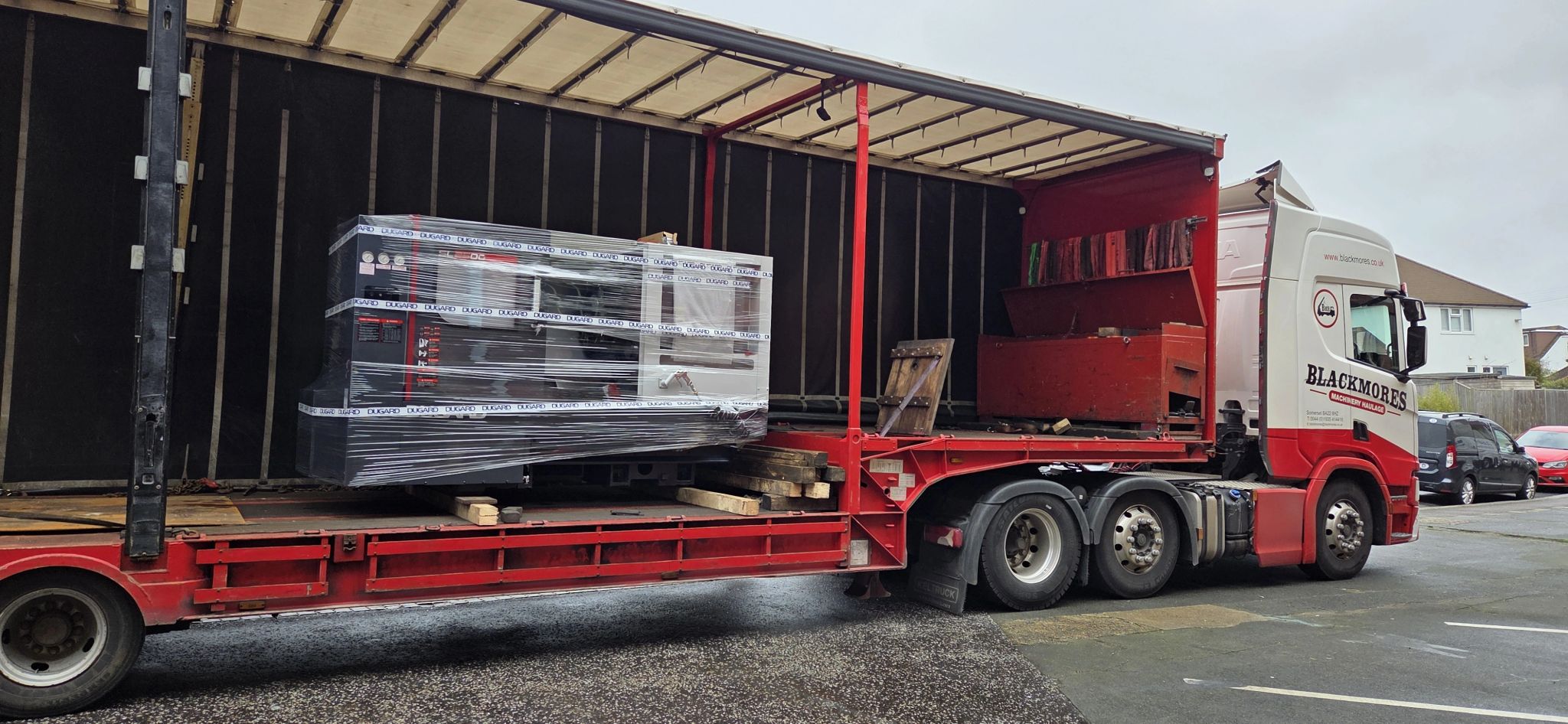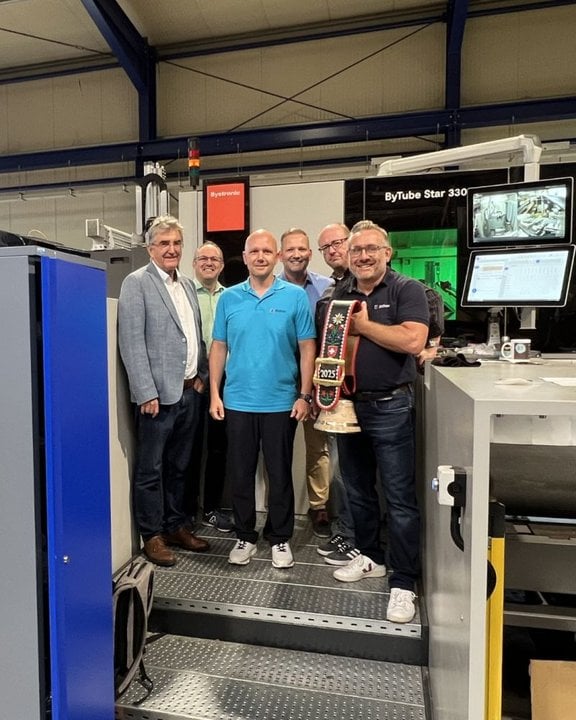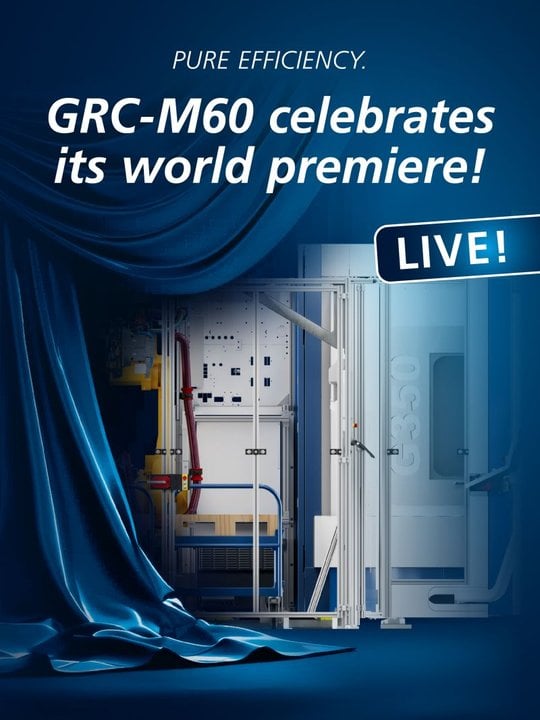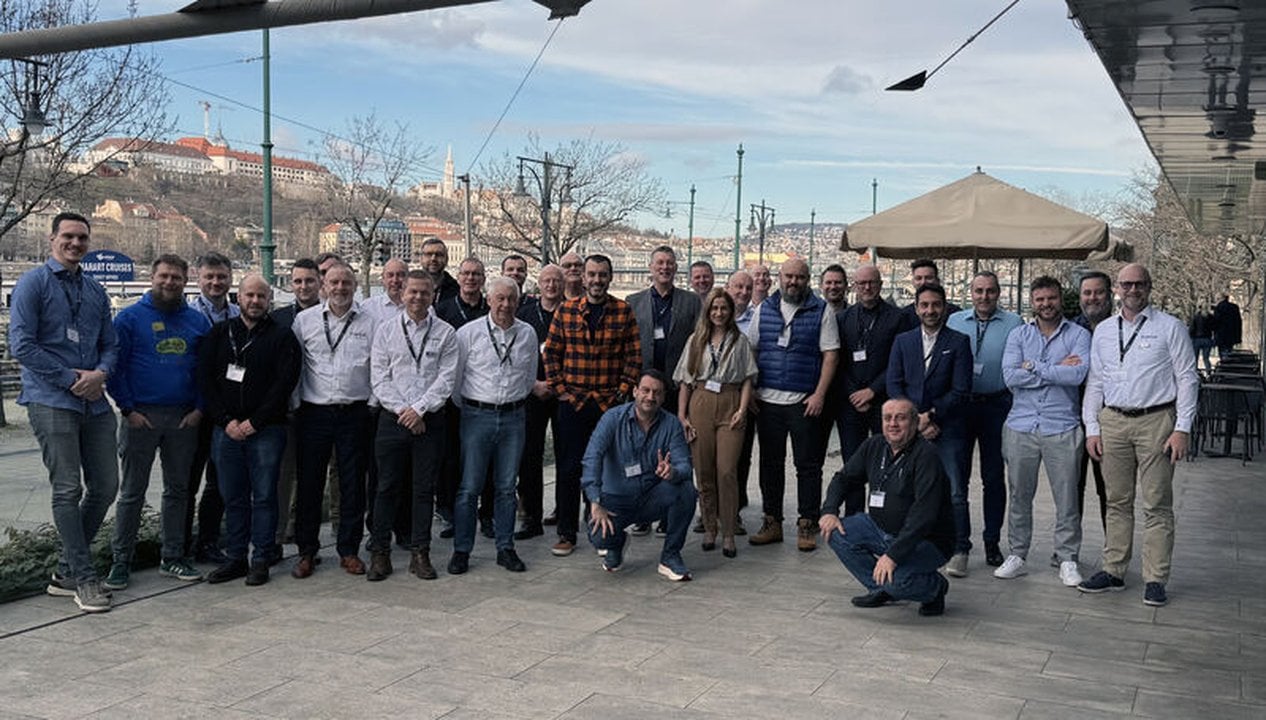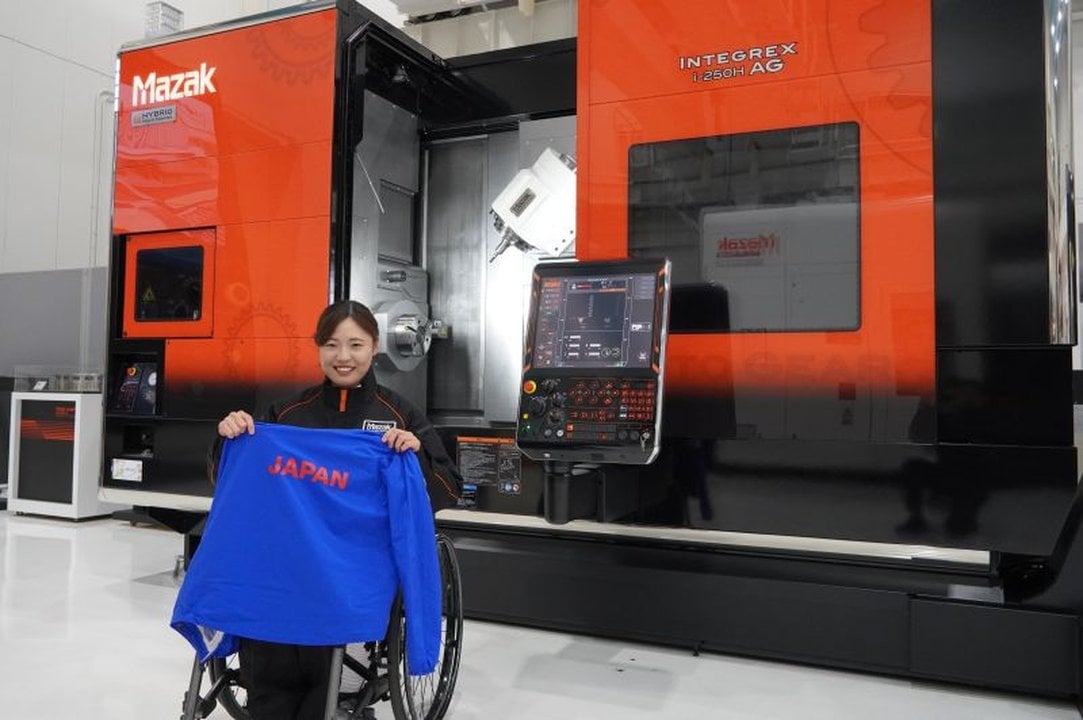
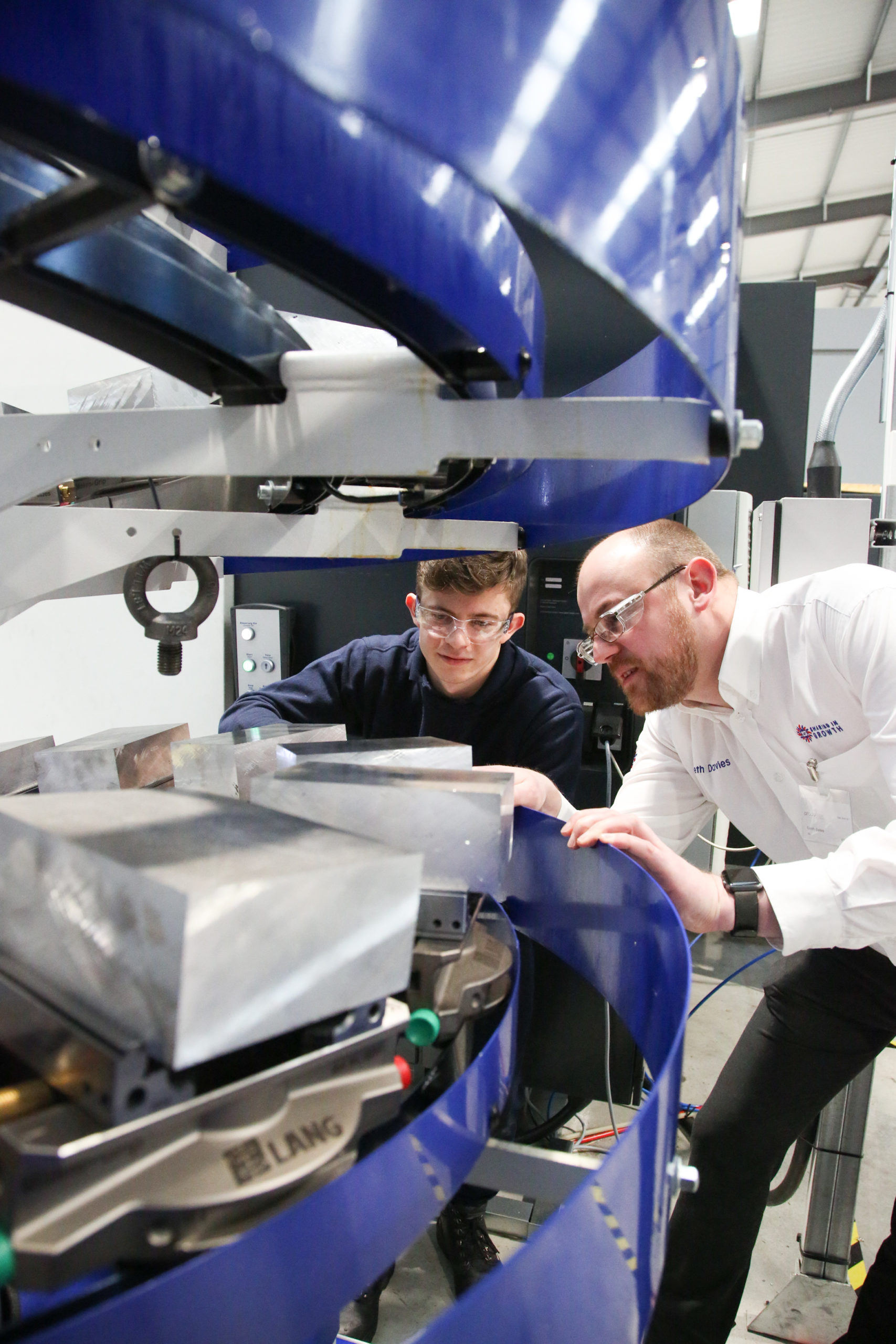
Women are increasingly taking leading roles in precision engineering and high-value-added manufacturing companies. To celebrate this trend, MTD magazine is running a series to profile these game-changers and the firms they lead. The first is with Mandy Ridyard, Finance Director of Produmax. By John Yates.

When aerospace manufacturing boss Mandy Ridyard proposed seafood as her strategic response to the pandemic, her team of ‘engineering superheroes’ assembled on the shop floor could have been forgiven for thinking their charismatic leader had finally lost the plot.
“Covid was a disaster for aerospace. We had gone from projected growth of 20% to a halving of our turnover,” says Mandy, who knew she needed to pivot a business that almost overnight had become precariously dependent on the once-booming, but suddenly grounded, aviation sector.
“We went from a sales strategy based on creating capacity to meet the demands of ramped up aircraft production to one of creating sales to meet our under-utilised machining capacity. It was a complete 180 degree turn,” said Mandy, whose Bradford-based precision engineering firm Produmax, recently won MakeUK’s coveted national SME of the Year award.
The seafood strategy, she explains, was all about diversification and communication; the two ingredients needed to secure a prosperous future for the firm and its talented people. The new markets she identified were space, energy, additive, civil aerospace, other and defence – with ‘other’ as a catch-all for any drop-in-lap opportunities that didn’t take capacity from elsewhere. Hence the acronym – Sea Cod.
The image of a sea cod on the opening slide presenting the new strategy to her team was also a brilliant visual mnemonic and prompted smiles all round: not easy to do when facing such challenging headwinds. Instead of dependency on four major aerospace clients, the sea cod trawl has landed Produmax a haul that includes nuclear energy, satellite and space, fuel cells for hydrogen buses, aircraft electrification and automotive.
Mandy believes this diversification has enabled Produmax to resist drastic staff cuts, thus ensuring the firm’s mission to be ‘engineering superheroes’ is not jeopardised. By using the second furlough to allow staff to learn new skills in other roles she has improved the mental well-being of the team – many of whom had found the first furlough at home difficult – and made the business more agile to face future shocks.
Rather than retrench, Mandy is on-boarding and growing new talent to create a much more diverse and inclusive culture in the business: an ethos she and her husband, Jeremy, have embedded in the business since they took over the firm in 1997 following the retirement of the founder and a management buy-in/earn-out.

Back then, the business was focused chiefly on telecoms – which they both knew would soon migrate to low-cost factories in the Far East – and the workforce demographics reflected the UK average of 52 years old.
“We knew that was not sustainable so we diversified the business into aerospace and began to change the demographics of our people. Our latest recruits are 50/50 male and female and the average age has come down to under 35 years old,” said Mandy, who is a passionate advocate of diversity and apprenticeships and has the battle scars to prove it.
In the early years, when Produmax operated out of an old tannery building in Otley, it was almost as difficult to change the culture on the shop floor as it was to change the CNC machines. “Back then we had to lift the roof off the building to crane equipment in and out. We had world-class shop floor utilisation, but you needed to be a small size eight to squeeze between the machines. We also had girlie calendars and banter across the shop floor,” says Mandy who is no stranger to gender bias in the workplace herself.
“I remember my first meeting at a major packaging company, I was a graduate trainee and there were other graduates in the room but I was the only female and I was the one they asked to make the coffee,” says Mandy. When she came back with the tray of drinks she asked the manager whether he would like her to take notes too. “He got the message and never asked me again.”

Her approach to the girlie calendars was equally effective. Instead of ordering them to be taken down, she said they could stay, but she would be putting calendars of semi-naked firefighters next to them. The calendars disappeared and, as the workforce has become younger and more diverse, so too has the banter.
Changing the firm’s demographics requires a big commitment. It’s meant building close relationships first with further education colleges and, today, with local schools from secondary down to primary. From sending free bar ends to technical leads at local colleges, to using her growing cohort of skilled apprentices as ‘engineering superheroes’ taking the manufacturing message into schools, Mandy is changing the profile of CNC precision engineering in a region that boasts more manufacturing jobs than anywhere in the north.
“We don’t do that because we are nice people – which we are – but because it makes good business sense. If you increase your diversity, you have so many more people to choose from and better access to talent which is proven to increase your productivity – which is the number one priority for us and a priority for the West Yorkshire Combined Authority mayoralty,” says Mandy who is now very much engaged in helping policymakers across the region understand the vital role that advanced manufacturing has to play in ‘levelling up’ the North.
“You could say that Jeremy is the brains of the company and I am the mouthpiece,” says Mandy who is now Chair of the West Yorkshire Innovation network. When she asks people for an example of innovation the answer is invariably a product: the iPhone, the light bulb and the paper clip. “They never think of a process or service as being an innovation. Produmax is a very smart manufacturer, but we have never innovated a product, we make components and parts to the client’s design and to the quality they require. That makes us a service and that is where the innovation happens: making the processes on the shopfloor more productive.”
Alongside the Innovation Network, Mandy is also a leading light in Space Hub Yorkshire, where she has developed a ‘virtual space campus’ that connects 12 universities and 34 regional colleges across Yorkshire to ensure the region’s businesses understand how to get their fair share of funding and who to partner with across the region. One small step for Mandy; but potentially a giant leap for the region.

9 April 2020. Picture Bruce Rollinson
She attributes much of her ability to be the firm’s in-house marketeer to participating in Sharing in Growth, the Rolls Royce inspired management programme with the tag line: growing great businesses by developing great people. “It was only after this programme that I started to explore a more outward-facing role,” says Mandy whose initial reaction to Jeremy’s idea of engaging with the program was one of scepticism. Today she is an evangelical convert and the firm has twice won Sharing in Growth’s top awards.
“It made a huge difference. Neither of us – and our team – had had any recent management training. We were totally honest and open with them and absorbed everything like a sponge. We now have better acumen around the financials. Where we used to measure everything off the profit and loss, we now measure everything through a series of metrics that feed into this. It’s easy to think you are efficient when you’re growing, but this allowed us to see how much more we could do by being smarter.
“It also enabled us to become better at engaging and developing our people and in exposing the business to the wider world. But, really measuring engagement requires bravery because you don’t always get the feedback you want. There wasn’t really any bad stuff, but sometimes when you are trying your very best and that isn’t good enough the impact is a bit like your daughter saying she doesn’t like your cooking.” Devastating.
During the pandemic, these marketing and engagement skills have paid dividends. “We have marketed hard and worked massively on business development, collaborating on a new dedicated additive facility at Silverstone Park. We are now engineering more than ten new parts a month, which is hugely challenging. It’s a bit like being a start-up where everything you do is money hungry; the new work we are winning needs new tools, new materials, new programming and that doesn’t bring immediate profit. But we know we have a strong order book and the skills to fulfil it when the time comes to deliver.”
Over the last year, Produmax has taken on four new apprentices – “continuing with what we believe in, even though times are tough” – and broken the mould by promoting a 17-year-old female apprentice to the role of cell leader manufacturing the gearbox housing for the Boeing Dreamliner.
“The company has never had an apprentice in this role before, there has always been this time-served thing around engineering, but Jasmine is brilliant. She is also embarking on an engineering degree at the University of Nottingham University as part of the research-intensive Russell Group. This kind of appointment changes the dynamic of the business, it brings new thinking and new ideas that will enable Produmax – and precision engineers like us – to be more innovative and productive,” Mandy said. Now that is a catch worth landing.


